有机食品与转基因食品的比较(英文)
有机食品与转基因食品的比较

GM food not only has low investment and high output value, but also has great contribution to solve the food problem.
Views on GM food and organic food
The comparative analysis of both GM food and organic food
LOGO
Contents
1 Definition odvantages and disadvantages
of GM food
3
Views on GM food and organic food
Definition of GM and organic food
Definition
GM foods
Organic food
GM food
• Genetically modified food refers to the genetically modified organism strain obtained by the use of GM technology, and the food processed and produced with the GM organism as direct food or raw material is called GM food.
有机食物和无机食物英语作文
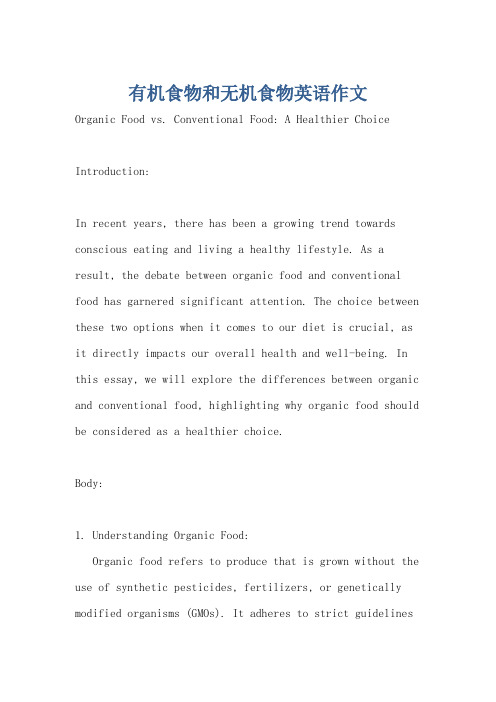
有机食物和无机食物英语作文Organic Food vs. Conventional Food: A Healthier ChoiceIntroduction:In recent years, there has been a growing trend towards conscious eating and living a healthy lifestyle. As a result, the debate between organic food and conventional food has garnered significant attention. The choice between these two options when it comes to our diet is crucial, as it directly impacts our overall health and well-being. In this essay, we will explore the differences between organic and conventional food, highlighting why organic food should be considered as a healthier choice.Body:1. Understanding Organic Food:Organic food refers to produce that is grown without the use of synthetic pesticides, fertilizers, or genetically modified organisms (GMOs). It adheres to strict guidelinesset by certification bodies to ensure its authenticity. Organic farming practices focus on promoting biodiversity and protecting the natural ecosystem.2. Benefits of Organic Food:- Nutritional Value: Studies have shown that organic fruits and vegetables contain higher levels of essential vitamins, minerals, and antioxidants compared to conventionally-grown counterparts.- No Harmful Chemicals: By consuming organic food, we minimize our exposure to harmful pesticides and chemicals that are commonly used in conventional farming practices. This reduces the risk of potential health problems such as hormone disruption, neurotoxicity, or even certain cancers. - Environmental Impact: Organic farming methodsprioritize soil conservation, water management, andwildlife preservation. By choosing organic food, we support sustainable agricultural practices that protect our environment.3. Concerns with Conventional Food:- Pesticide Residues: Conventionally-grown fruits andvegetables often carry pesticide residues that can pose risks to human health over time.- GMOs: Many conventional crops are genetically modified to enhance their growth or resistance to pests. The long-term effects of consuming GMOs remain uncertain.- Animal Welfare: Conventional livestock production involves overcrowding animals in confined spaces and subjecting them to hormone treatments and antibiotics. This not only compromises animal welfare but also affects the quality of meat or dairy products we consume.4. Making Informed Choices:- Read Labels: When shopping, look for labels indicating organic certification for fruits, vegetables, meat, and dairy products.- Local and Seasonal: Opt for locally sourced and seasonal organic produce whenever possible. This guarantees freshness while supporting local farmers.- Budget Considerations: While organic food may seem more expensive, it is important to prioritize our health. Start by gradually incorporating organic options into your diet or focus on prioritizing certain foods wherepesticides are found in higher concentrations. Conclusion:Choosing between organic food and conventional food goes beyond merely satisfying hunger; it is a decision that can significantly impact our health and the environment. Although there may be some budgetary constraints for some individuals, the long-term benefits of consuming organic food outweigh the initial costs. By making informed choices today, we contribute to a healthier future for both ourselves and the planet.。
有机食品与转基因食品

伴孢晶体 鳞翅目幼虫口服 伴孢晶体在肠道迅速溶解 (中肠pH为9.0-10.5)
晶体蛋白 (ICP)
基因,能够产 生伴孢晶体蛋
吸附于上皮细胞,引起渗透性丧失,肠道穿孔 白并杀 死 害虫 。 昆虫不再进食,1-3天后饿死
死虫虫体变黑
29
遭到玉米螟侵害和真菌感染的
普通玉米(左)和Bt玉米(右)
30
遭受虫害的普通玉米
消费者普遍认为,
有机食品是最安全、 最健康的。某著名电 视主持人在他的转基 因调查视频里就宣称
有机食品有益健康。
实际上,近年来有机食品出现过非常严重的安全事故。
2011年5、6月,来自德国一家有机农场的认证有机食 品导致一场波及 16 个国家的大肠杆菌 O104:H4 流行, 3950 人得病,53人死亡。在德国,约有100名并发溶血性尿毒综 合析。
舆论,如果是在现在,农业部肯定不敢批准抗虫棉的种
植,然后从美国、印度进口抗虫棉来用。 中国转基因作物种植面积为世界第六位,作物品种 包括棉花、番茄、杨树、牵牛花、抗病毒木瓜和甜椒。
南非推广种植转基因抗虫玉米后,虫害得到控制,种植密度
增加,玉米单产提高了一倍,由玉米进口国变成了出口国。
近20年来抗虫转基因玉米和棉花的种植为农民节省了
任何污染,生产过程中不使用任何化学合成的农药、肥料、
除草剂和生长素等,加工过程中不使用任何化学合成的食 品防腐剂、添加剂、人工色素和用有机溶剂提取等,贮藏、 运输过程中不能受有害化学物质污染,必须符合国家食品 卫生法的要求和食品行业质量标准。
从有机食品的历史上看,这种东西从一开始就不
是为了更健康的。 1920 年之前,全世界的食品都是有 机的。化学品用于农业种植后,欧洲的一些农民出于 守旧等原因,坚持不用化学品,这就是有机农业的雏 形。二战后期开始战时技术民用,农业生产快速非有 机化,直到 1962 年雷切尔 · 卡森的《寂静的春天》问 世,讲述了生态破坏,特别是 DDT的使用,引起巨大 反响,也使得有机农业摆脱了抱残守缺的形象,以更 安全的姿态摇身一变成为现代有机农业。
有机,绿色,无公害,转基因食品的区别
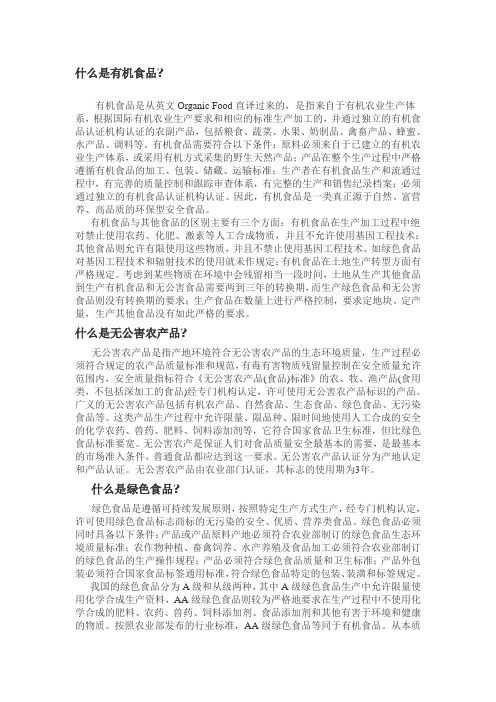
什么是有机食品?有机食品是从英文Organic Food直译过来的,是指来自于有机农业生产体系,根据国际有机农业生产要求和相应的标准生产加工的,并通过独立的有机食品认证机构认证的农副产品,包括粮食、蔬菜、水果、奶制品、禽畜产品、蜂蜜、水产品、调料等。
有机食品需要符合以下条件:原料必须来自于已建立的有机农业生产体系,或采用有机方式采集的野生天然产品;产品在整个生产过程中严格遵循有机食品的加工、包装、储藏、运输标准;生产者在有机食品生产和流通过程中,有完善的质量控制和跟踪审查体系,有完整的生产和销售纪录档案;必须通过独立的有机食品认证机构认证。
因此,有机食品是一类真正源于自然、富营养、高品质的环保型安全食品。
有机食品与其他食品的区别主要有三个方面:有机食品在生产加工过程中绝对禁止使用农药、化肥、激素等人工合成物质,并且不允许使用基因工程技术;其他食品则允许有限使用这些物质,并且不禁止使用基因工程技术。
如绿色食品对基因工程技术和辐射技术的使用就未作规定;有机食品在土地生产转型方面有严格规定。
考虑到某些物质在环境中会残留相当一段时间,土地从生产其他食品到生产有机食品和无公害食品需要两到三年的转换期,而生产绿色食品和无公害食品则没有转换期的要求;生产食品在数量上进行严格控制,要求定地块、定产量,生产其他食品没有如此严格的要求。
什么是无公害农产品?无公害农产品是指产地环境符合无公害农产品的生态环境质量,生产过程必须符合规定的农产品质量标准和规范,有毒有害物质残留量控制在安全质量允许范围内,安全质量指标符合《无公害农产品(食品)标准》的农、牧、渔产品(食用类,不包括深加工的食品)经专门机构认定,许可使用无公害农产品标识的产品。
广义的无公害农产品包括有机农产品、自然食品、生态食品、绿色食品、无污染食品等。
这类产品生产过程中允许限量、限品种、限时间地使用人工合成的安全的化学农药、兽药、肥料、饲料添加剂等,它符合国家食品卫生标准,但比绿色食品标准要宽。
有机食品的优缺点英语作文
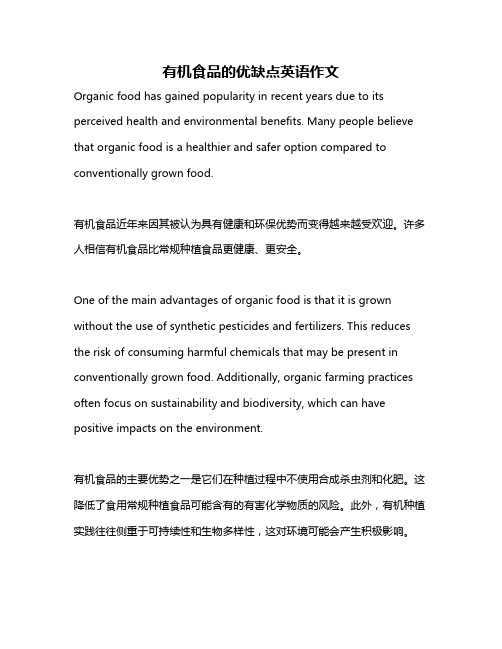
有机食品的优缺点英语作文Organic food has gained popularity in recent years due to its perceived health and environmental benefits. Many people believe that organic food is a healthier and safer option compared to conventionally grown food.有机食品近年来因其被认为具有健康和环保优势而变得越来越受欢迎。
许多人相信有机食品比常规种植食品更健康、更安全。
One of the main advantages of organic food is that it is grown without the use of synthetic pesticides and fertilizers. This reduces the risk of consuming harmful chemicals that may be present in conventionally grown food. Additionally, organic farming practices often focus on sustainability and biodiversity, which can have positive impacts on the environment.有机食品的主要优势之一是它们在种植过程中不使用合成杀虫剂和化肥。
这降低了食用常规种植食品可能含有的有害化学物质的风险。
此外,有机种植实践往往侧重于可持续性和生物多样性,这对环境可能会产生积极影响。
However, one of the biggest drawbacks of organic food is its higher cost. Organic food generally comes with a premium price tag, making it less accessible to lower-income individuals. This can create a disparity in access to healthy food options, as those with limited financial resources may not be able to afford organic products.然而,有机食品最大的缺点之一是它的高成本。
有机食品的利与弊英语作文
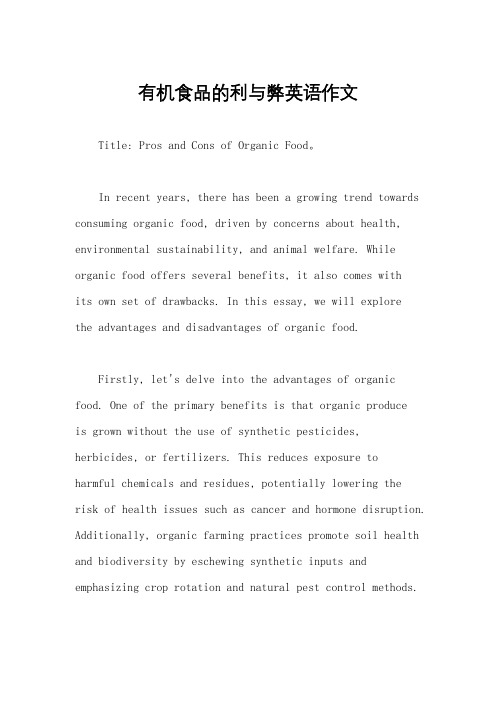
有机食品的利与弊英语作文Title: Pros and Cons of Organic Food。
In recent years, there has been a growing trend towards consuming organic food, driven by concerns about health, environmental sustainability, and animal welfare. While organic food offers several benefits, it also comes withits own set of drawbacks. In this essay, we will explorethe advantages and disadvantages of organic food.Firstly, let's delve into the advantages of organic food. One of the primary benefits is that organic produceis grown without the use of synthetic pesticides, herbicides, or fertilizers. This reduces exposure toharmful chemicals and residues, potentially lowering therisk of health issues such as cancer and hormone disruption. Additionally, organic farming practices promote soil health and biodiversity by eschewing synthetic inputs and emphasizing crop rotation and natural pest control methods.Furthermore, organic livestock farming adheres tostrict animal welfare standards, with animals having access to outdoor areas and being raised without antibiotics or growth hormones. This results in meat, dairy, and eggs that are often perceived as being of higher quality and more humane than their conventional counterparts.Moreover, organic farming practices tend to have lower environmental impacts compared to conventional agriculture. By eschewing synthetic inputs and focusing on sustainable practices like composting and cover cropping, organic farms reduce pollution of waterways and soil erosion while conserving energy and promoting biodiversity. Additionally, organic farming typically consumes less water and produces fewer greenhouse gas emissions, contributing to overall environmental sustainability.However, despite these advantages, organic food also has its drawbacks. One of the most significant drawbacks is the higher cost associated with organic products. Organic farming requires more labor-intensive practices and often yields lower crop yields, leading to higher prices forconsumers. This can make it inaccessible to low-income individuals and families, perpetuating issues of food insecurity and inequality.Additionally, there is ongoing debate and conflicting evidence regarding the nutritional superiority of organic food compared to conventional counterparts. While some studies suggest that organic produce may contain higher levels of certain nutrients and antioxidants, others find little to no difference. Thus, the perceived health benefits of organic food may be overstated, leading consumers to pay a premium for products without clear evidence of superior nutritional value.Furthermore, organic farming practices may not always be as efficient or productive as conventional methods, leading to concerns about global food security. With a growing global population and increasing pressure on agricultural resources, some argue that organic farming's lower yields and land use efficiency could exacerbate food shortages and environmental degradation.In conclusion, organic food offers several potential benefits, including reduced exposure to harmful chemicals, improved animal welfare, and lower environmental impacts. However, it also comes with drawbacks such as higher costs, uncertain nutritional advantages, and potential challenges for global food security. Ultimately, the decision to consume organic food should be based on individual preferences, values, and circumstances, weighing the trade-offs between health, environmental concerns, and affordability.。
转基因食品优缺点英文
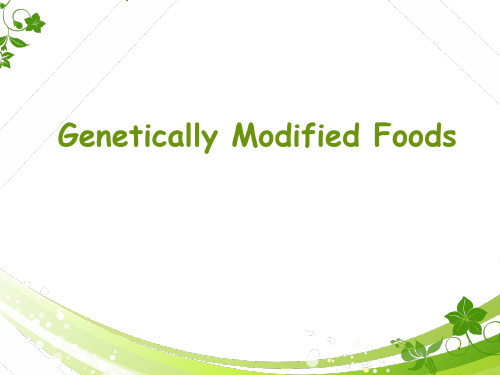
thanks!
Potatoes
Tomatoes
Beans
GM foods' advantages
Increase crop yield per unit area. Reduce the production cost. Through transgenic technology can enhance the ability
Now,there are some common GM foods in china ,such as beans,rice,tomatoes,potatoes,corn etc.
The emergence of GM foods is unavoidable, we can't blindly reject it.With the development of science and p olicy, I believe that one day people can safely eat it.
The goals of the human need to GM organisms for dir ect food or as raw material processing production of foo d is genetically modified food.
GM and Non-GM contrast
Genetically Modified Foods
What's GM foods GM and Non-GM contrast GM foods' advantages GM foods' drawbacks View
What's GM foods
有机食品比传统食物更健康的英语作文

有机食品比传统食物更健康的英语作文Organic food has become increasingly popular in recent years as more people become aware of the benefits of choosing natural and sustainable options. Many people believe that organic food is healthier than traditional foods due to the way it is grown and processed. In this essay, we will explore the reasons why organic food is considered healthier than conventional food.One of the main reasons why organic food is considered healthier is the way it is produced. Organic farming practices focus on using natural methods to grow crops and raise animals without the use of synthetic pesticides, herbicides, and fertilizers. This means that organic food is free from harmful chemicals that can accumulate in the body and have negative effects on human health. In contrast, conventional farming relies heavily on the use of these chemicals, which can have harmful effects on both our health and the environment.Furthermore, organic food is often fresher and more nutrient-dense than traditional food. Organic fruits and vegetables are usually harvested at peak ripeness, which means they are higher in vitamins, minerals, and antioxidants. Additionally, organic meat and dairy products are often produced from animals that are raised on pasture and fed anatural diet, resulting in products that are higher in beneficial nutrients like omega-3 fatty acids. In contrast, conventional food often undergoes long transportation and storage periods, which can lead to a loss of nutrients and freshness.In addition, organic food is also believed to be better for the environment and for animal welfare. Organic farming practices are more sustainable and environmentally friendly, as they promote soil health, biodiversity, and water conservation. By choosing organic food, consumers can support farming methods that are less harmful to the planet and help protect natural ecosystems. Furthermore, organic farming practices prioritize animal welfare, ensuring that animals are treated humanely and are not exposed to unnecessary stress or suffering.Overall, there are many reasons why organic food is considered healthier than traditional food. From the way it is grown and processed to its nutrient content and environmental impact, organic food offers numerous benefits that can support a healthier lifestyle. By choosing organic food, consumers can make a positive impact on their health, the environment, and animal welfare. In conclusion, organic food is a valuable and important choice for those looking to prioritize their health and well-being.。
有机食品与传统食品区别的英语作文
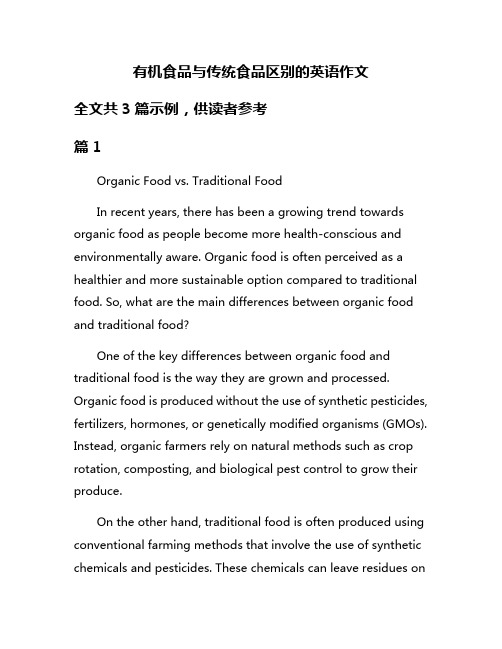
有机食品与传统食品区别的英语作文全文共3篇示例,供读者参考篇1Organic Food vs. Traditional FoodIn recent years, there has been a growing trend towards organic food as people become more health-conscious and environmentally aware. Organic food is often perceived as a healthier and more sustainable option compared to traditional food. So, what are the main differences between organic food and traditional food?One of the key differences between organic food and traditional food is the way they are grown and processed. Organic food is produced without the use of synthetic pesticides, fertilizers, hormones, or genetically modified organisms (GMOs). Instead, organic farmers rely on natural methods such as crop rotation, composting, and biological pest control to grow their produce.On the other hand, traditional food is often produced using conventional farming methods that involve the use of synthetic chemicals and pesticides. These chemicals can leave residues onthe produce and have been linked to health problems such as cancer, hormone disruption, and environmental pollution.Another difference between organic food and traditional food is in the way they are processed and preserved. Organic food is minimally processed and free from artificial additives, preservatives, and synthetic flavors. This means that organic food is more natural and retains more of its original nutrients and taste.Traditional food, on the other hand, is often heavily processed with artificial additives, preservatives, and flavor enhancers to improve shelf life and taste. These additives can have negative health effects and detract from the nutritional value of the food.Furthermore, organic food is generally more environmentally friendly compared to traditional food. Organic farming practices promote soil health, water conservation, and biodiversity, leading to a more sustainable and eco-friendly food system. In contrast, traditional farming methods can degrade soil quality, pollute water sources, and harm wildlife habitats.In terms of animal products, organic meat, dairy, and eggs come from animals that are raised without the use of antibiotics, hormones, or GMO feed. These animals are also given access tooutdoor pasture and are treated humanely, leading to higher quality and more ethically produced products.Conversely, traditional animal products often come from animals that are raised in intensive confinement operations, fed a diet of GMO grains and antibiotics, and subjected to inhumane treatment. This can result in lower quality and less sustainable animal products.Overall, the differences between organic food and traditional food are clear. Organic food is grown and processed in a more natural and sustainable way, leading to higher quality, healthier, and more environmentally friendly products. While traditional food may be more convenient and cheaper, it often comes at the cost of our health and the environment. As consumers become more conscious of these differences, the demand for organic food is expected to continue to rise in the coming years.篇2Organic Food vs. Conventional Food: A ComparisonIn recent years, there has been a growing interest in organic food as consumers become more conscious about what they eat and where it comes from. There is a common misconception thatorganic food is healthier and better for the environment than conventional food. In this essay, we will explore the differences between organic food and conventional food and how they impact our health and the environment.One of the main differences between organic food and conventional food is the way they are produced. Organic food is grown without the use of synthetic pesticides, fertilizers, or genetically modified organisms (GMOs). Instead, organic farmers rely on natural methods such as crop rotation, composting, and the use of beneficial insects to control pests. On the other hand, conventional food is produced using chemical pesticides, fertilizers, and GMOs to increase yields and protect crops from pests and diseases.Another key difference between organic food and conventional food is the use of antibiotics and hormones in livestock production. Organic livestock are raised without the use of antibiotics or growth hormones, and they are typically given access to pasture and allowed to graze freely. In contrast, conventional livestock are often raised in crowded and unsanitary conditions, given antibiotics to prevent infections, and fed a diet of GMO grains and synthetic hormones to promote growth.In terms of nutrition, organic food is believed to be more nutritious and better for your health than conventional food. Studies have shown that organic fruits and vegetables contain higher levels of antioxidants, vitamins, and minerals compared to conventionally grown produce. Organic meat and dairy products also tend to have higher levels of omega-3 fatty acids and lower levels of unhealthy fats and hormones. However, some experts argue that the differences in nutrition between organic and conventional food are minimal and that the most important factor is a balanced diet with a variety of foods.When it comes to the environment, organic food is considered to be more sustainable and eco-friendly than conventional food. Organic farming practices help to protect soil and water quality, reduce greenhouse gas emissions, and promote biodiversity. By avoiding the use of synthetic chemicals and fertilizers, organic farmers help to preserve the natural balance of ecosystems and protect wildlife habitats. In contrast, conventional farming practices can have negative impacts on the environment, such as soil erosion, water pollution, and loss of biodiversity.In conclusion, organic food and conventional food differ in the way they are produced, the use of antibiotics and hormones,nutrition, and environmental impact. While organic food is generally thought to be healthier and better for the environment, it is important to note that both organic and conventional food can be part of a healthy diet. Ultimately, the choice between organic and conventional food depends on individual preferences, values, and budget constraints. By making informed choices and supporting sustainable food systems, we can help to create a healthier and more environmentally friendly food system for future generations.篇3Organic Food vs. Conventional FoodIn recent years, there has been a growing trend towards organic food as people become more conscious about their health and the environment. But what exactly is the difference between organic and conventional food? In this essay, we will explore the various aspects that differentiate the two types of food.One of the main differences between organic and conventional food is the way they are grown and processed. Organic food is produced using natural farming methods without the use of synthetic pesticides, fertilizers, or geneticallymodified organisms. On the other hand, conventional food is grown using chemical fertilizers, pesticides, and genetically modified organisms to maximize crop yield and protect against pests and diseases.Another key difference between organic and conventional food is the impact on the environment. Organic farming practices are designed to minimize the impact on the environment by promoting biodiversity, conserving water and soil, and reducing pollution. In contrast, conventional farming practices can lead to soil erosion, water contamination, and deforestation due to the use of chemical inputs.In terms of nutrition, studies have shown that organic food may have higher levels of certain nutrients such as antioxidants, vitamins, and minerals compared to conventional food. This is because organic crops are grown in nutrient-rich soil and are not exposed to synthetic chemicals that may degrade the nutritional value of the food.Furthermore, organic food is also free from artificial additives, preservatives, and synthetic flavors that are commonly found in conventional food. This makes organic food a healthier choice for those who are looking to avoid harmful chemicals and additives in their diet.When it comes to taste, many people believe that organic food has a richer and more natural flavor compared to conventional food. This is because organic crops are allowed to ripen naturally on the vine without the use of artificial ripening agents or preservatives, which can affect the taste and quality of the food.In conclusion, organic food and conventional food differ in terms of how they are grown, processed, and their impact on the environment, nutrition, and taste. While organic food may be more expensive than conventional food, many people believe that the benefits in terms of health, taste, and the environment make it a worthwhile investment. Ultimately, the choice between organic and conventional food is a personal one based on individual preferences and priorities.。
有机食品与传统食品区别的英语作文
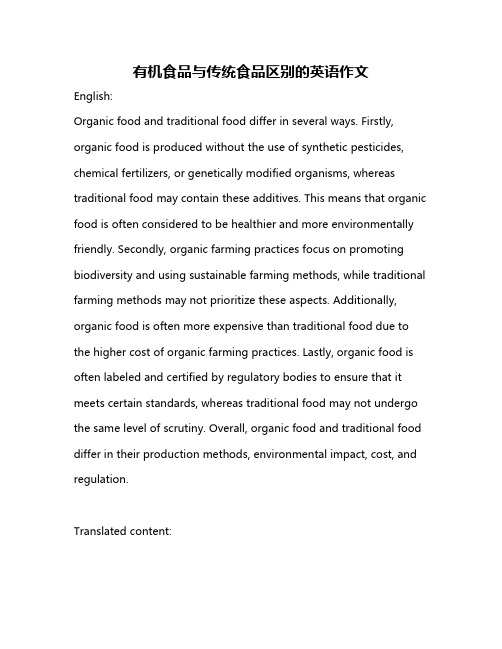
有机食品与传统食品区别的英语作文English:Organic food and traditional food differ in several ways. Firstly, organic food is produced without the use of synthetic pesticides, chemical fertilizers, or genetically modified organisms, whereas traditional food may contain these additives. This means that organic food is often considered to be healthier and more environmentally friendly. Secondly, organic farming practices focus on promoting biodiversity and using sustainable farming methods, while traditional farming methods may not prioritize these aspects. Additionally, organic food is often more expensive than traditional food due to the higher cost of organic farming practices. Lastly, organic food is often labeled and certified by regulatory bodies to ensure that it meets certain standards, whereas traditional food may not undergo the same level of scrutiny. Overall, organic food and traditional food differ in their production methods, environmental impact, cost, and regulation.Translated content:有机食品和传统食品在几个方面存在差异。
(英文PPT)对转基因食品与有机食品的观点
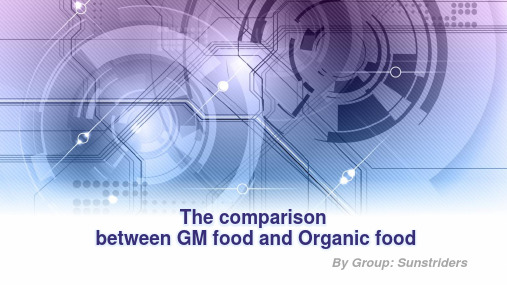
Contrast
Increase crop yield and reduce cost
Less pests and virus for crops
Nonuse of genetic technology
Ban food additives
Unknown effects on human health
The comparison between GM food and Organic food
By Group: Sunstriders
Content
Definitions of GM food and organic food
Comparisons
Attitudes and viewpoints
Abundance of nutrient materials
Eco-friendly
International attitudes
Western countries African countries
European countries
Asian countries
Viewpoints
For genetically modified food • As far as I’m concerned, genetically modified food can indeed meet some needs that people want, but meanwhile, the GM food security should be paid more attention to because of the risk of unclear effects. For organic food • To our knowledge, the organic food is worth practical production. And we are more likely to choose it if organic food can be more productive and beneficial to our bodies. Organic food still needs promotion and improvements.
有机食品比传统食品更健康英语作文
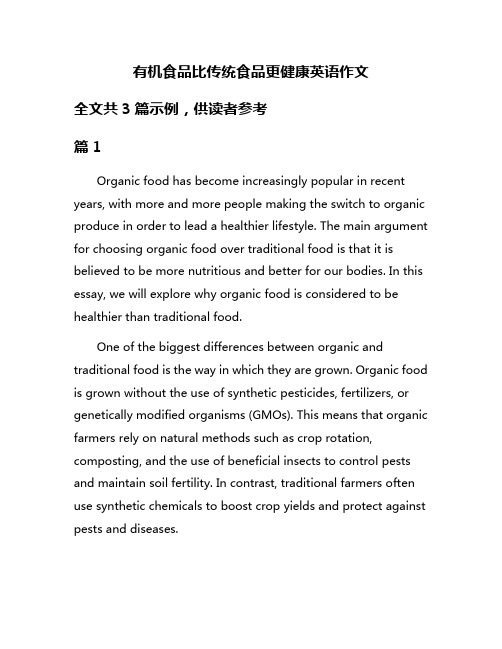
有机食品比传统食品更健康英语作文全文共3篇示例,供读者参考篇1Organic food has become increasingly popular in recent years, with more and more people making the switch to organic produce in order to lead a healthier lifestyle. The main argument for choosing organic food over traditional food is that it is believed to be more nutritious and better for our bodies. In this essay, we will explore why organic food is considered to be healthier than traditional food.One of the biggest differences between organic and traditional food is the way in which they are grown. Organic food is grown without the use of synthetic pesticides, fertilizers, or genetically modified organisms (GMOs). This means that organic farmers rely on natural methods such as crop rotation, composting, and the use of beneficial insects to control pests and maintain soil fertility. In contrast, traditional farmers often use synthetic chemicals to boost crop yields and protect against pests and diseases.The use of synthetic pesticides and fertilizers in traditional farming has been linked to a number of health problems, including cancer, reproductive issues, and neurological disorders. These chemicals can also leach into the soil and water, causing further damage to the environment. Organic food, on the other hand, is free from these harmful substances, making it a safer and healthier choice for consumers.In addition to being free from synthetic chemicals, organic food is also believed to be more nutritious than traditional food. Studies have shown that organic fruits and vegetables are higher in antioxidants, vitamins, and minerals than their conventional counterparts. This is because organic plants are grown in healthier soil, which is rich in nutrients and microbial activity. These nutrients are then passed on to the consumer, providing greater health benefits.Furthermore, organic food is also better for the environment. Organic farming practices are designed to minimize the impact on the land, water, and air. By avoiding synthetic chemicals and promoting biodiversity, organic farmers help to protect and preserve natural ecosystems. This not only benefits the environment but also ensures the long-term sustainability of our food production system.Despite the numerous benefits of organic food, some critics argue that there is little scientific evidence to support the claim that organic food is healthier than traditional food. While it is true that more research is needed in this area, the existing studies do suggest that organic food may offer some advantages in terms of nutritional value and safety.In conclusion, organic food is considered to be healthier than traditional food due to its lack of synthetic chemicals, higher nutrient content, and positive impact on the environment. By choosing organic produce, consumers can support sustainable farming practices and improve their overall health and well-being. In the face of increasing concerns about food safety and environmental sustainability, the choice to go organic is more important than ever.篇2Organic food has become increasingly popular in recent years as consumers become more health-conscious and concerned about the impact that conventional agriculture has on the environment. Many people believe that organic food is healthier than traditional food because it is grown without the use of synthetic pesticides, fertilizers, hormones, or genetically modified organisms. In this essay, we will explore the reasonswhy organic food is considered to be healthier than traditional food.One of the main reasons why organic food is seen as being healthier is because it is free from synthetic pesticides and fertilizers. These chemicals are used in conventional agriculture to control pests and increase yields, but they can also leave behind harmful residues on fruits, vegetables, and grains. Studies have shown that consuming these residues can have negative effects on human health, including an increased risk of cancer, hormonal imbalances, and even neurological disorders. By choosing organic food, consumers can avoid these harmful chemicals and reduce their exposure to potentially dangerous substances.Another reason why organic food is considered to be healthier is because it is free from hormones and genetically modified organisms (GMOs). In conventional agriculture, hormones are often used to promote faster growth and increase milk production in livestock, while GMOs are used to make crops more resistant to pests and drought. However, the long-term effects of consuming these substances are not yet fully understood, and some studies suggest that they may have negative impacts on human health. Organic food, on the otherhand, is produced without the use of hormones or GMOs, making it a safer and healthier choice for consumers.Furthermore, organic food is often fresher and more nutritious than traditional food. Because organic farmers do not use synthetic chemicals to preserve their crops, fruits and vegetables are allowed to ripen naturally on the vine and retain more of their nutrients. Additionally, studies have shown that organic fruits and vegetables contain higher levels of vitamins, minerals, and antioxidants than their conventional counterparts. By choosing organic food, consumers can ensure that they are getting the maximum nutritional benefits from their diets.In addition to being healthier for consumers, organic food is also better for the environment. Conventional agriculture relies heavily on the use of synthetic chemicals and intensive farming practices that can contribute to soil degradation, water pollution, and loss of biodiversity. Organic farming, on the other hand, focuses on sustainable practices that preserve soil health, protect water quality, and support biodiversity. By supporting organic agriculture, consumers can help to reduce their carbon footprint and promote a more sustainable food system for future generations.In conclusion, organic food is widely seen as being healthier than traditional food for a variety of reasons. By choosing organic food, consumers can avoid harmful chemicals, hormones, and GMOs, while also enjoying fresher, more nutritionally-dense food. Additionally, organic farming practices are better for the environment, making organic food a more sustainable choice for those who care about the health of the planet. Overall, the evidence suggests that organic food is a healthier and more responsible choice for consumers who want to prioritize their health and the well-being of the planet.篇3Organic food has become increasingly popular in recent years, with many people believing it to be a healthier alternative to traditional food. But is this belief backed by scientific evidence? In this essay, we will explore the health benefits of organic food compared to traditional food.Firstly, organic food is grown without the use of synthetic pesticides, herbicides, and fertilizers. These chemicals can leave residue on the food we eat, which can be harmful to our health. In contrast, organic farmers use natural methods like crop rotation, composting, and beneficial insects to control pests and enrich the soil. This results in food that is free from harmfulchemicals and pesticides, making it healthier for human consumption.Secondly, organic food is also free from genetically modified organisms (GMOs). GMOs have been linked to a range of health issues, including allergies, digestive problems, and even cancer. By choosing organic food, you can avoid these potential health risks and ensure that you are consuming food in its purest form.Additionally, organic food is often fresher and more nutritious than traditional food. Organic fruits and vegetables are typically grown in nutrient-rich soil, which results in higher levels of vitamins, minerals, and antioxidants. This means that by eating organic food, you are getting more nutritional value out of every bite.Furthermore, organic food is also better for the environment. Organic farming practices promote biodiversity, reduce pollution, and conserve water and soil resources. By choosing organic food, you are supporting sustainable agriculture and helping to protect the planet for future generations.In conclusion, organic food is a healthier and more environmentally friendly option compared to traditional food. By choosing organic, you can reduce your exposure to harmful chemicals, GMOs, and pesticides, while also supportingsustainable farming practices. So next time you are grocery shopping, consider opting for organic food for a healthier and more nutritious diet.。
有机食品的好处和坏处英语作文
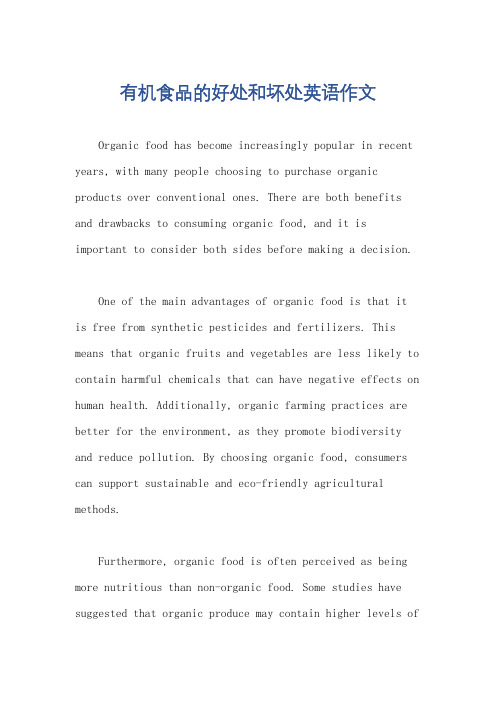
有机食品的好处和坏处英语作文Organic food has become increasingly popular in recent years, with many people choosing to purchase organic products over conventional ones. There are both benefits and drawbacks to consuming organic food, and it is important to consider both sides before making a decision.One of the main advantages of organic food is that itis free from synthetic pesticides and fertilizers. This means that organic fruits and vegetables are less likely to contain harmful chemicals that can have negative effects on human health. Additionally, organic farming practices are better for the environment, as they promote biodiversity and reduce pollution. By choosing organic food, consumers can support sustainable and eco-friendly agricultural methods.Furthermore, organic food is often perceived as being more nutritious than non-organic food. Some studies have suggested that organic produce may contain higher levels ofcertain nutrients, such as antioxidants and vitamins. Additionally, organic meat and dairy products are typically free from antibiotics and growth hormones, which can be present in conventional animal products.On the other hand, there are some drawbacks to consuming organic food. One of the main disadvantages is the higher cost of organic products compared to non-organic ones. Organic farming methods are often more labor-intensive and require more resources, leading to higher production costs. As a result, organic food tends to be more expensive, making it less accessible to lower-income individuals.Another potential drawback of organic food is that it may have a shorter shelf life than non-organic food. Because organic products do not contain preservatives or other synthetic additives, they may spoil more quickly. This can lead to food waste and higher expenses for consumers who need to replace spoiled organic items more frequently.In addition, there is ongoing debate about whether organic food is truly safer and more nutritious than non-organic food. Some studies have found little difference in the nutrient content of organic and non-organic produce, while others have raised concerns about the potential risks of organic farming practices, such as the use of natural pesticides that may also be harmful to human health.Despite these drawbacks, many people still choose to consume organic food due to the perceived benefits for both personal health and the environment. The decision to purchase organic products is ultimately a personal one, and individuals should weigh the pros and cons based on their own values and priorities. Whether one chooses to support organic farming or not, it is important to make informed decisions about food consumption and consider the potential impacts on health, the environment, and the broader food system.。
有机食品比传统食物更健康的英语作文
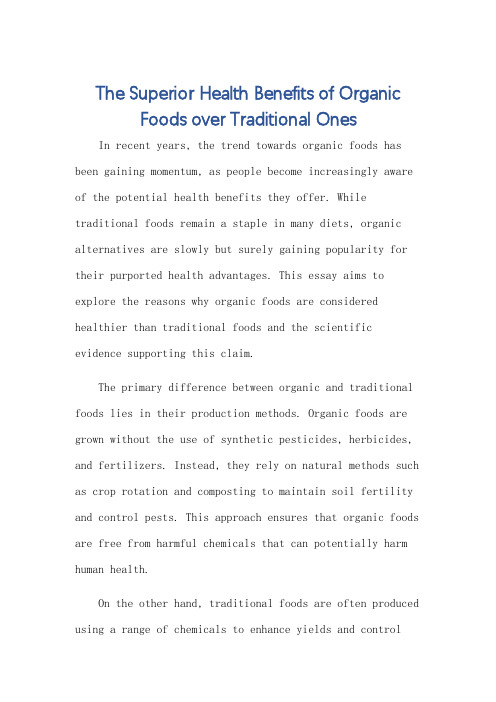
The Superior Health Benefits of Organic Foods over Traditional OnesIn recent years, the trend towards organic foods has been gaining momentum, as people become increasingly aware of the potential health benefits they offer. While traditional foods remain a staple in many diets, organic alternatives are slowly but surely gaining popularity for their purported health advantages. This essay aims to explore the reasons why organic foods are considered healthier than traditional foods and the scientific evidence supporting this claim.The primary difference between organic and traditional foods lies in their production methods. Organic foods are grown without the use of synthetic pesticides, herbicides, and fertilizers. Instead, they rely on natural methods such as crop rotation and composting to maintain soil fertility and control pests. This approach ensures that organic foods are free from harmful chemicals that can potentially harm human health.On the other hand, traditional foods are often produced using a range of chemicals to enhance yields and controlpests. While these chemicals may increase production efficiency, they can also leave residual toxins on the food, which can accumulate in the human body over time. Long-term exposure to these toxins has been linked to various health problems, including cancer, hormonal imbalances, and neurological disorders.Another key advantage of organic foods is their higher nutritional value. Studies have shown that organic produce contains significantly higher levels of vitamins, minerals, and antioxidants than conventionally grown foods. These nutrients are essential for maintaining good health and fighting against chronic diseases. By consuming organic foods, individuals can ensure that they are getting the maximum amount of nutrients from their diet.Moreover, organic foods are also believed to be more flavorful and tasty than traditional foods. This is because organic produce is grown under optimal conditions, allowing them to develop their natural flavors and textures. In contrast, conventionally grown foods may be harvestedbefore they are fully ripe or may have been stored forextended periods, resulting in a loss of flavor and freshness.In conclusion, the evidence suggests that organic foods offer a range of health benefits over traditional foods. They are free from harmful chemicals, contain higher levels of nutrients, and are generally more flavorful and tasty. While organic foods may be more expensive and less widely available than traditional foods, their health benefits make them a worthwhile investment for those seeking to improve their overall health and well-being.**有机食品比传统食物更健康的理由**近年来,有机食品的趋势逐渐增强,因为人们越来越意识到它们可能带来的健康益处。
英文对转基因食品与有机食品的观点
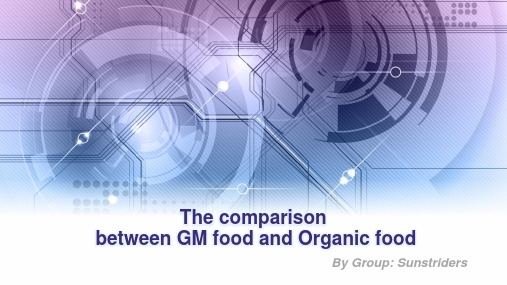
Genetically Modified Food
Genetically modified (GM) food is processed by genetically modified organisms, which transfer one or several exogenous (外源 性) genes into certain living organism through genetic engineering technology to make it express the corresponding products (peptide or protein).
African countries
European countries
Asian countries
Viewpoints
For genetically modified food
• As far as I’m concerned, genetically modified food can indeed meet some needs that people want, but meanwhile, the GM food security should be paid more attention to because of the risk of unclear effects.
THANKYOU
批注本地保存成功开通会员云端永久保存去开通
The comparison between GM food and Organic food
By Group: Sunstriders
Content
Definitions of GM food and organic food Comparisons
有机食品和无机食品的区别英语作文
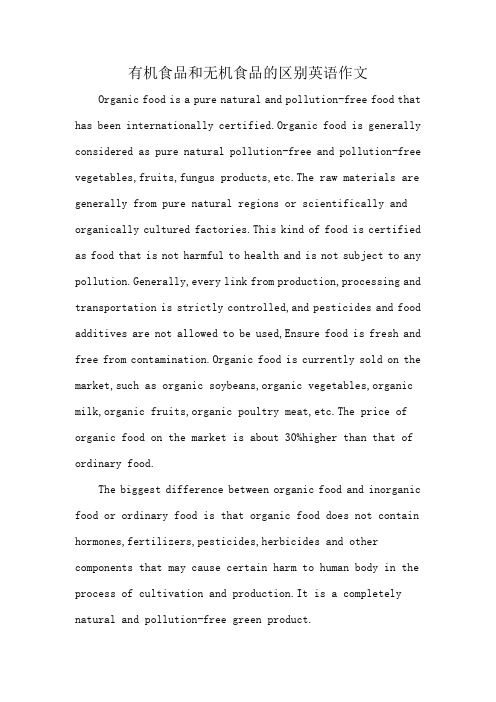
有机食品和无机食品的区别英语作文Organic food is a pure natural and pollution-free food that has been internationally anic food is generally considered as pure natural pollution-free and pollution-free vegetables,fruits,fungus products,etc.The raw materials are generally from pure natural regions or scientifically and organically cultured factories.This kind of food is certified as food that is not harmful to health and is not subject to any pollution.Generally,every link from production,processing and transportation is strictly controlled,and pesticides and food additives are not allowed to be used,Ensure food is fresh and free from anic food is currently sold on the market,such as organic soybeans,organic vegetables,organic milk,organic fruits,organic poultry meat,etc.The price of organic food on the market is about 30%higher than that of ordinary food.The biggest difference between organic food and inorganic food or ordinary food is that organic food does not contain hormones,fertilizers,pesticides,herbicides and other components that may cause certain harm to human body in the process of cultivation and production.It is a completely natural and pollution-free green product.The difference between organic food and inorganic food As of 2021,there is no inorganic food in China,which mostly refers to ordinary anic food is also called biological food,which is a unified name for pure natural pollution-free food in the world.In organic food,there are often special signs.And the certification standard is very strict.The difference between organic food and inorganic food The judgment criteria for organic food usually include the following contents.First,its raw materials must be completely derived from organic production systems or wild natural products.Secondly,we must follow the guidelines and strictly control the quality in the food processing process.Finally,it must pass the certification of legal institutions.。
【精品推荐】有机食品和转基因食品的关系
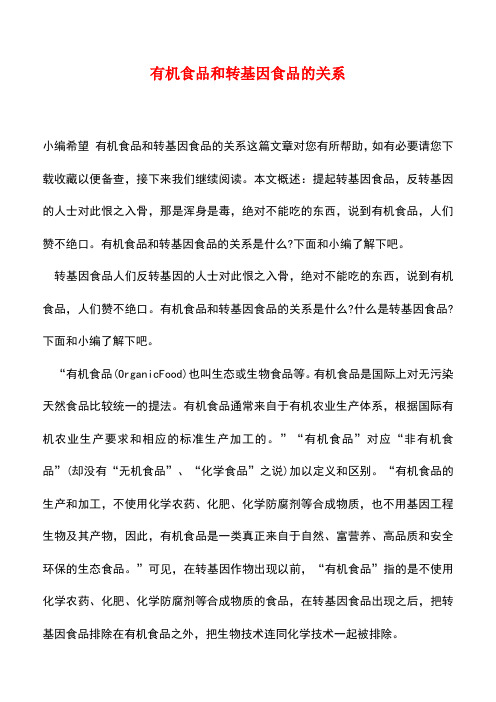
有机食品和转基因食品的关系
小编希望有机食品和转基因食品的关系这篇文章对您有所帮助,如有必要请您下载收藏以便备查,接下来我们继续阅读。
本文概述:提起转基因食品,反转基因的人士对此恨之入骨,那是浑身是毒,绝对不能吃的东西,说到有机食品,人们赞不绝口。
有机食品和转基因食品的关系是什么?下面和小编了解下吧。
转基因食品人们反转基因的人士对此恨之入骨,绝对不能吃的东西,说到有机食品,人们赞不绝口。
有机食品和转基因食品的关系是什么?什么是转基因食品?下面和小编了解下吧。
“有机食品(OrganicFood)也叫生态或生物食品等。
有机食品是国际上对无污染天然食品比较统一的提法。
有机食品通常来自于有机农业生产体系,根据国际有机农业生产要求和相应的标准生产加工的。
”“有机食品”对应“非有机食品”(却没有“无机食品”、“化学食品”之说)加以定义和区别。
“有机食品的生产和加工,不使用化学农药、化肥、化学防腐剂等合成物质,也不用基因工程生物及其产物,因此,有机食品是一类真正来自于自然、富营养、高品质和安全环保的生态食品。
”可见,在转基因作物出现以前,“有机食品”指的是不使用化学农药、化肥、化学防腐剂等合成物质的食品,在转基因食品出现之后,把转基因食品排除在有机食品之外,把生物技术连同化学技术一起被排除。
有机食物比传统食物更健康英语作文
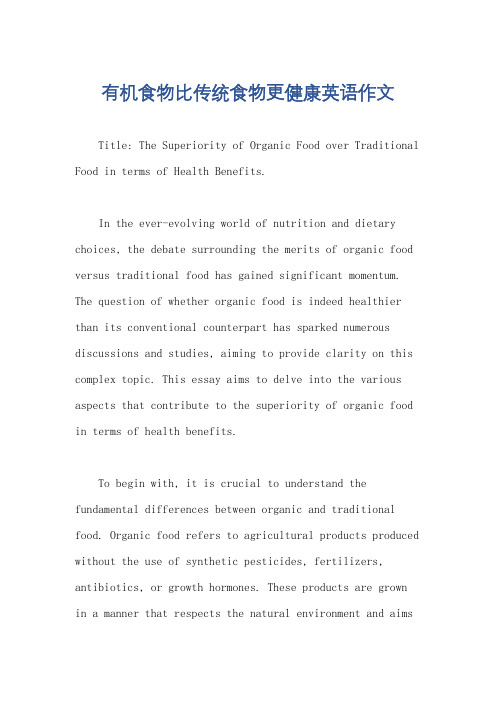
有机食物比传统食物更健康英语作文Title: The Superiority of Organic Food over Traditional Food in terms of Health Benefits.In the ever-evolving world of nutrition and dietary choices, the debate surrounding the merits of organic food versus traditional food has gained significant momentum. The question of whether organic food is indeed healthier than its conventional counterpart has sparked numerous discussions and studies, aiming to provide clarity on this complex topic. This essay aims to delve into the various aspects that contribute to the superiority of organic food in terms of health benefits.To begin with, it is crucial to understand the fundamental differences between organic and traditional food. Organic food refers to agricultural products produced without the use of synthetic pesticides, fertilizers, antibiotics, or growth hormones. These products are grownin a manner that respects the natural environment and aimsto preserve biodiversity. On the other hand, traditional food, often referred to as conventional food, is produced using modern agricultural techniques that often involve the use of chemicals and additives to enhance crop yields and prolong shelf life.One of the primary reasons why organic food is considered healthier is its reduced exposure to harmful chemicals. In traditional agriculture, synthetic pesticides and fertilizers are widely used to control pests and promote plant growth. However, these chemicals often remain in the food chain, even after harvesting and processing. Consuming foods containing these residues can have adverse effects on human health, including an increased risk of cancer, neurological disorders, and reproductive issues. Organic farming practices, on the other hand, rely onnatural methods such as crop rotation and the use oforganic manure to maintain soil fertility and control pests. This significantly reduces the risk of chemical residues in organic foods.Furthermore, organic foods tend to be richer.。
转基因食品的利与弊 英语作文

转基因食品的利与弊英语作文Advantages and Disadvantages of Genetically Modified Foods。
Genetically modified foods, also known as GMOs, are crops that have been altered through genetic engineering to improve their quality and resistance to pests and diseases. While some people argue that GMOs can help solve world hunger and reduce the use of harmful pesticides, others are concerned about their potential impact on human health and the environment. In this article, we will explore the advantages and disadvantages of genetically modified foods.Advantages:1. Increased crop yield: Genetic engineering can help crops produce more food per acre, which can help address food shortages and reduce the cost of food.2. Improved nutrition: Scientists can modify crops tocontain more vitamins and minerals, which can help address malnutrition in developing countries.3. Resistance to pests and diseases: Genetic engineering can help crops resist pests and diseases, which can reduce the need for harmful pesticides and herbicides.4. Longer shelf life: Some genetically modified crops can be designed to have a longer shelf life, which can reduce food waste and improve food security.5. Reduced environmental impact: By reducing the need for pesticides and herbicides, genetically modified crops can help reduce the environmental impact of agriculture.Disadvantages:1. Potential health risks: Some people are concerned that consuming genetically modified foods could have negative health effects, such as allergies or antibiotic resistance.2. Unknown long-term effects: Since genetically modified foods are a relatively new technology, their long-term effects on human health and the environment are not yet fully understood.3. Loss of biodiversity: Genetic engineering can lead to the loss of biodiversity, as crops are modified to be more uniform and resistant to pests and diseases.4. Cross-contamination: There is a risk that genetically modified crops could cross-contaminate non-GMO crops, which could have negative effects on biodiversity and the environment.5. Ethical concerns: Some people argue that genetic engineering is ethically problematic, as it involves manipulating the natural world in ways that may not be fully understood or controllable.In conclusion, genetically modified foods have both advantages and disadvantages. While they can help address food shortages and reduce the environmental impact ofagriculture, there are also concerns about their potential impact on human health and the environment. As with any new technology, it is important to carefully consider the potential risks and benefits of genetically modified foods before making decisions about their use.。
- 1、下载文档前请自行甄别文档内容的完整性,平台不提供额外的编辑、内容补充、找答案等附加服务。
- 2、"仅部分预览"的文档,不可在线预览部分如存在完整性等问题,可反馈申请退款(可完整预览的文档不适用该条件!)。
- 3、如文档侵犯您的权益,请联系客服反馈,我们会尽快为您处理(人工客服工作时间:9:00-18:30)。
Organic food
• Organic farming and organic food refers to according to the processing mode of production and processing; Products comply with international or national organic food requirements and standards; And all the products through the national certification body certification.
Views on GM food and organic food
• Organic food plant limited, due to the growing conditions demand is high, less money human input, output, cannot satisfy human food problem, so not widely planting, and less investment in gm foods, output value, harvest, to solve the food problem has a significant contribution to the population.
Views on GM food and organic food
• Organic food and genetically modified food has its advantages and disadvantages.
• So their existence is the trend of history, is the need of human development.
3 The difference between the GM
food and organic food
4 Views on GM food and organic
food
Team members
• Wang Xiao meng • Hong Ying • Zhao Shuang qing • Geng Man yu • Guo Zheng
Russia
The US
Do not ban genetically modified food circulation
95% of the people against eatinggenetically modified food
GM food has existed about 20 years in the market
Definition of GM and organic food
Definition
GM foods
Organic food
GM foods
• Genetically modified food is a kind of food that by using modern molecular biological technology transfers some biological gene to other species to transform of genetic material and make it transfer to what people need in its shape, nutritional quality and consumption quality.
NO.2
Organic foods are not allowed to use genetic engineering technology
NO.3
Organic food is a kind of real is the result of natural, rich nutrition, high quality and environmentally friendly safe food
The difference between the GM food and orgafood in the process of production and processing of absolute ban the use of synthetic material.
PPT froLm O18GgrOoup
The comparative analysis of both GM foods and organic foods from certain
perspectives
PPT fromLO18GgrOoup
Contents
1
Team members
2 Definition of GM andorganic food
• As you know,the use of genetically modified food in our country is still in question.
• But ,what about other countries?
Attitude towards GM food
Japan
